To multitask or not to multitask? Check out this wonderful research poster created by fellow OT, Marianne Meneses, that discusses multitasking and provides evidence-based research on its effectiveness.
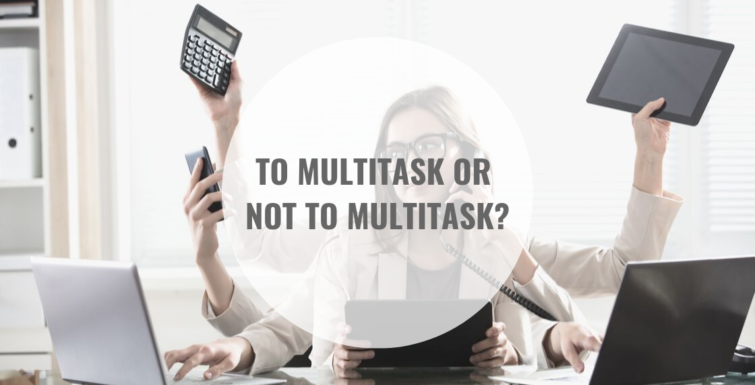

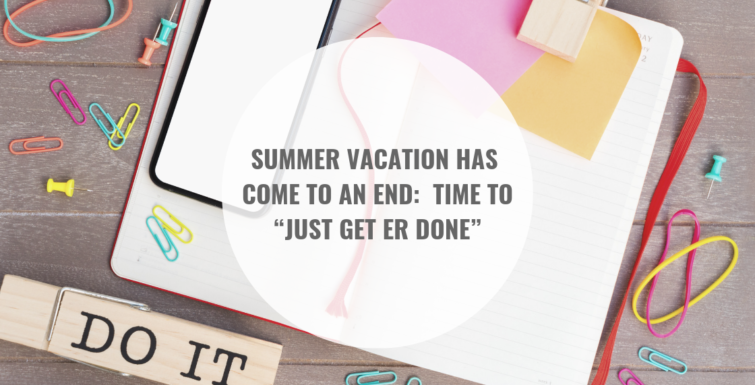
Julie Entwistle, MBA, BHSc (OT), BSc (Health / Gerontology)
Often I am asked by others how I balance the many aspects of my busy life. My answer is that I just “get er done”. In fact “get er done” is a mantra I use regularly to motivate me to knock things off my list.
For example, if I am driving and realize I will arrive at my destination 20 minutes early, often something (or several things) will pop into my head about how I should spend that extra time (stop into the bank, drop by the post office, grab that birthday present, stop at the store for some fresh veggies, etc.). Then, my head starts negotiating with itself (“no, just keep driving and you can check email for 20 minutes in the parking lot”, or “I don’t feel like doing that right now”, or “I don’t need that present until next week anyway”). Really, we can talk ourselves out of anything (mostly healthy eating, getting out of bed earlier, and exercise), but success comes from being able to hear through the noise to make the best decision. Learn more about how to take advantage of that extra 20 minutes in our post Don’t Multi-Task, Multi-Purpose – It’s Better for You.
In my case, when my head is conflicted by the devil and angel arguing on my shoulders, I apply the mantra: “Julie, just get er done”. Every time I say this, it springs me into action.
I remember watching a YouTube video by Mel Robbins that clearly explained that thoughts are just thoughts and to turn them into action, we need to attach a physical component. We have five seconds to turn a thought into an action or it won’t happen. So, when hearing the alarm, we have five seconds to throw off the covers and put our feet on the ground, or the “thought” of getting up will turn into the action of not. Same with the thought of exercising: if, within five seconds of thinking “I should go for a good walk” you have not gotten up and moved towards putting your runners on, chances are another thought will tell you to stay put.
So, turn those thoughts into action. Use mantras and physical responses to your thoughts to just “get er done”.
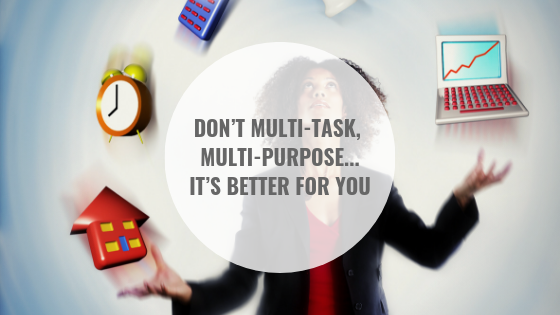
Julie Entwistle, MBA, BHSc (OT), BSc (Health / Gerontology)
Like the word “busy”, the words “multi-task” had a few years of being “cool”. People thought that “multi-tasking” was accomplishing more, being super-hero productive, and showing superior intellectual capacity. But research into multi-tasking has proven the opposite and in fact, our brains are not able to multi-task at all. In fact, trying to do two things at once is reducing our capability to manage either effectively.
In the article “12 Reasons to Stop Multi-Tasking Now” it is highlighted that society has moved towards the implication that if you are not doing two things at once, you are wasting time. It mentions the reasons to stop multi-tasking, including some important points like: “Moving back and forth between several tasks actually wastes productivity…because your attention is expended on the act of switching gears—plus, you never get fully “in the zone” for either activity”. This causes activities to take “more time” so instead of both taking say 10 minutes each, together they take you 25. Further, we miss things by trying to do too much. Our skills become careless, or it reduces our ability to enjoy moments if we are texting and walking or emailing while also trying to watch the ballet recital. Attending to two things at once actually drains our “working memory” which kills our creativity. There is just not an upside.
My solution is something I call “multi-purpose”. It is the way I try to spend my time when it makes sense to fit in multiple things. But I apply this to chores and tasks at home, more than work. For example, if I am out to get X, I will also survey my home and “to do list” to see if I can also do Y in the same errand. Our orthodontist is beside the bike shop and seamstress, so every trip to get braces tightened also means pants with holes or bikes with slow leaks are also addressed. The pet store is beside the Goodwill, so when the cats need food the donation bag in the garage is dropped off. The grocery store is beside my favorite gas station, so stopping for one usually means stopping for the other. With work, I, of course, try to book client visits that are nearby, and if I have time in between I want to know that I can stop at a coffee shop with my laptop for some charting (means I need to plan for this and bring my laptop with me). I also bring a lunch, as stopping to eat (in my opinion) doesn’t benefit my time, wallet or waistband. I may or may not return calls in the car (hands-free of course) – it depends on whether my brain (or heart) just needs to “reflect and drive” or the urgency of the call. Bottom line is that I don’t tend to go places without thinking “what else can I accomplish during this outing and how can my time be best spent?” The things that fill my day tend to serve many purposes, but they are still done separately. That is the art of multi-purpose without the troubles and inefficiencies of the misleading concept of “multi-tasking”.

Julie Entwistle, MBA, BHSc (OT), BSc (Health / Gerontology)
Meat Loaf says it best: “if you are only killing time it will kill you right back.” How true.
As we all try to cram more into our days, weeks, and nights we are creating unsustainable expectations for ourselves and for those that rely on each of us to get stuff done. In a previous post, Time “Savers” that Could Kill You, I offered my opinion on what I would consider dangerous and potentially life-threatening “time savers” that seem to be becoming commonplace in our manically productive world. Sleep deprivation, texting or emailing when driving, fast food and avoiding exercise were all on my list.
With that aside, I would now like to share the seemingly effective strategies I personally try to utilize for managing and maximizing time. But to be clear, I don’t have a degree or certificate in time management from any reputable institution. I am just a busy working mom of four kids who has been able to stay fit, get a Master’s degree, and run a business all because I can get lots done in a day. I have also read numerous books on productivity, health, happiness and personal development and have been able to incorporate many of the strategies I have read and learned into my world. So, here are what I would call my “tricks of the trade”…
Do you have other time maximizing ideas? I would love to hear them.
Originally posted August 2014
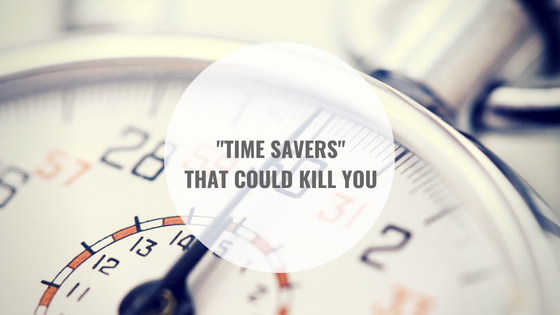
Julie Entwistle, MBA, BHSc (OT), BSc (Health / Gerontology)
I have been asked a few times to write a blog on time management. While I don’t profess to be an expert in this, people often do ask me how I “fit it all in” and my answer is always “I have learned how to effectively manage my time”. What still surprises me though is those people that have not yet shifted their focus to “managing time”, but instead try to “save time” or wish there was just more of it. For me, that thinking is disillusioned. We can’t find or get more time – time is constant. What we need to focus on then is using the time we have optimally and in line with our priorities. This takes insight and self-discipline to accomplish, and in a future blog I will speak to some of my personal strategies here.
But before I do that, I wanted to start with the list of “time savers” that I don’t endorse. Ones that I feel are, in the extreme, life-threatening and yet have become staples, patterns and habits by many, bragged about by some, and only work to help people shove more stuff into their already hectic schedule without forcing them to realize the real problem is prioritizing. So, here is the list of the time savers that I feel could kill:
Sleep Less. I will admit that I have previously considered cutting a few hours of my zzz so I could steal a few more hours of “productive” time. This is not an uncommon thought. Many people speak openly, or even brag, about how they “worked until 5am” or “only got a few hours of sleep last night cramming to meet a deadline”. Entrepreneurs are the worst. Our minds don’t tend to shut off and you will often find us emailing in the late hours or very early mornings. However, evidence continues to mount that “adequate sleep” is one of the key predictors of health and happiness, and the age-old 7-8 hours per night still applies as a recommended dosage. Even napping is now being encouraged as a way to shut off the mind and to cognitively and physically reboot mid-day (I keep my naps to 20 minutes to not interrupt my sleep cycle). What research is showing is that inadequate sleep actually worsens brain capacity, making people less productive. So, the time you gain from sleeping less you then lose (and then some) in productivity. I would rather sleep thanks! Thus, stop thinking that sleeping is a hindrance to your ability to get things done. Reducing your zzz will only be a detriment to your health in the long run.
Texting or Emailing when Driving. Illegal or not, this is still happening and now texting and driving is the leading cause of motor vehicle accidents and deaths. STOP IT (yes, I am yelling at you guilty folks). Newsflash: the only thing you should be doing when driving is, well, driving. If we are talking about time management here, then think about the time you could lose from making this mistake. Lost work time while you are recovering from an accident. Loss of career if you can never return to work due to a disability. Lost productive time when you are dragged into a lawsuit when you cause a collision and are sued as a result (worse if you are driving a company car and take your employer down with you). Lost ability to emotionally manage when you know you caused another person’s (maybe someone in your own car) injury or death. The list goes on. And remember too that if you are emailing or texting when driving – what is the nature of the message anyway? Short and curt, fraught with spelling errors, auto-correct problems, or even those catastrophic email errors that are caused from forwarding the wrong message to the wrong person or “replying to all” when you meant to reply. There are both health and reputational risks from texting or emailing when driving and thus the time it might “save” you could cost you everything. The solution? If you have to multi-task driving with communication, use the phone with a hands-free device. Then at least your eyes are still on the road.
Fast Food. I need to preface my comments here with the reality that I was raised in a fast food family. This was our business and I worked in our restaurant chain from when I was 13 to 19. So, believe me, I get the appeal of fatty and good tasting food that is provided quickly. But this too is killing us. Obesity, diabetes, heart disease, and many other chronic illnesses are caused by poor dietary habits. Yet, people continue to think that using the drive-through will save them time. My experience with “fast food” is that it is rarely fast (just time your drive-through and walk-in experiences) and some of what is served is not even really food. Processed, frozen, overcooked, stale, loaded with additives and preservatives. Yummy. Also consider that when eating “out” people tend to overeat and consume significantly more calories than if they ate at home or prepared a snack before they left. Several years ago I used to love to grab a Tim Horton’s before my first client of the day. After all, I would be in the car for 30-60 minutes and drinking my tea was an enjoyable beginning to my morning. Then I became cognizant of the time I was spending in line. 5-10 minutes per morning was 25-50 minutes per week of just “waiting”. Not to mention the accumulating cost of some hot water in a paper cup with a tea bag. So, I decided to go “Tim’s Free”. It was liberating. I could (and still do) drive by Tim Horton’s and smile at the drive-through line while I drink my home-made tea that takes me 1 minute to make and costs a nickel. While I still understand that “fast food” is a treat, and can be used as such, I will argue that too many people who proclaim to be “so busy” actually waste time waiting for crappy food. The solution? Have some ready-made meals or snacks in the fridge and grab these on your way out the door. Put them in a cooler bag, or store them in your work fridge. Forgoing the fast-food habit will save you time, calories, and ultimately your health.
“No Time” to Exercise. This one drives me batty. So many people claim to “not have the time” to exercise despite the ample evidence proving that exercise is a #1 predictor of health. This “no time” excuse needs to stop. We all have the same amount of time in a day, so the reality is that people don’t MAKE the time, or this is just not a priority. That is not a judgment. If exercise is not a priority then people can just admit this and stop using “time” as the shield. Personally, I believe that the time spent exercising pays itself forward in productivity. Reduced stress, more energy, increased mood, better time management, improved ability to prioritize, and of course all this on top of the fact that this could lengthen life. Avoiding exercise to “save time” is a fallacy. I don’t buy it. Personally, I think I qualify as “busy” but still exercise 1-2 hours daily. So people need to be honest with themselves, their priorities and recognize that avoiding exercise to “save time” could have the opposite effect.
In the end, consider your “time savers” and project these over the next 10 years. What will that look like for you? Don’t wait to suffer the consequences of sleep deprivation, a car accident, a health issue from poor eating habits, or physical decline from a neglected body to realize that being productive at the cost of your health is not productive at all.
Originally posted July 2014
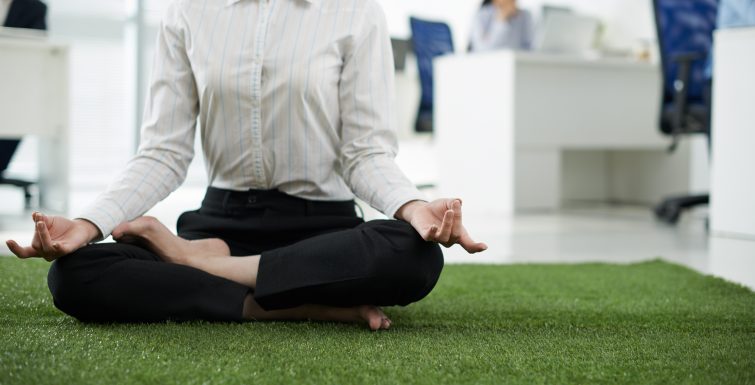
Humans are not made for immobility. Even if you take a healthy joint and put it in a cast for even a few days, when you remove this the movement of the joint will be decreased, pain will appear, and muscles that surround the joint will have started to atrophy. So, how does this translate to jobs that require us to sit all day, being immobile at a computer, in a car, or at a desk?
It’s important for your physical and mental health to involve frequent movement into your day. Not only will this help you combat the negative effects of “sitting disease,” it can help you to become more productive. Take a look at the following from Positive Health Wellness for some tips and simple stretches to incorporate into your work day.
Positive Health Wellness: 12 Quick Stretches to Boost Day-time Productivity
To learn more about Sitting Disease and how you can prevent the negative effects, take a look at our previous post, “Solutions To Stop Sitting Disease.”
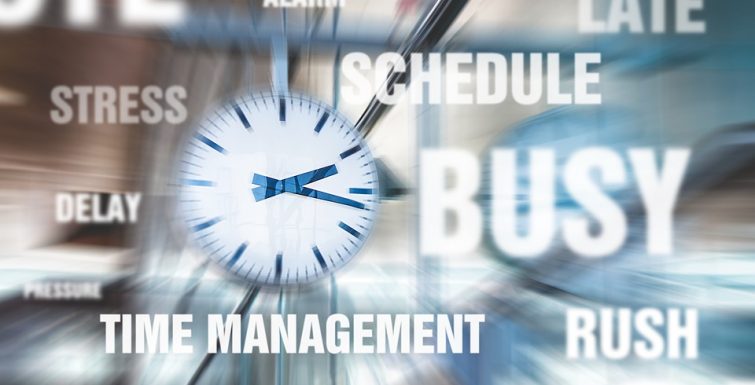
Time is precious. As we all try to cram more into our days, weeks, and nights we are creating unsustainable expectations for ourselves and for those that rely on each of us to get stuff done. Whether working on a specific project or working to keep home, family and career running smoothly, the tips in the following infographic “Secrets to Successfully Managing Your Time” can help you to stay organized, stay focused and get things done!
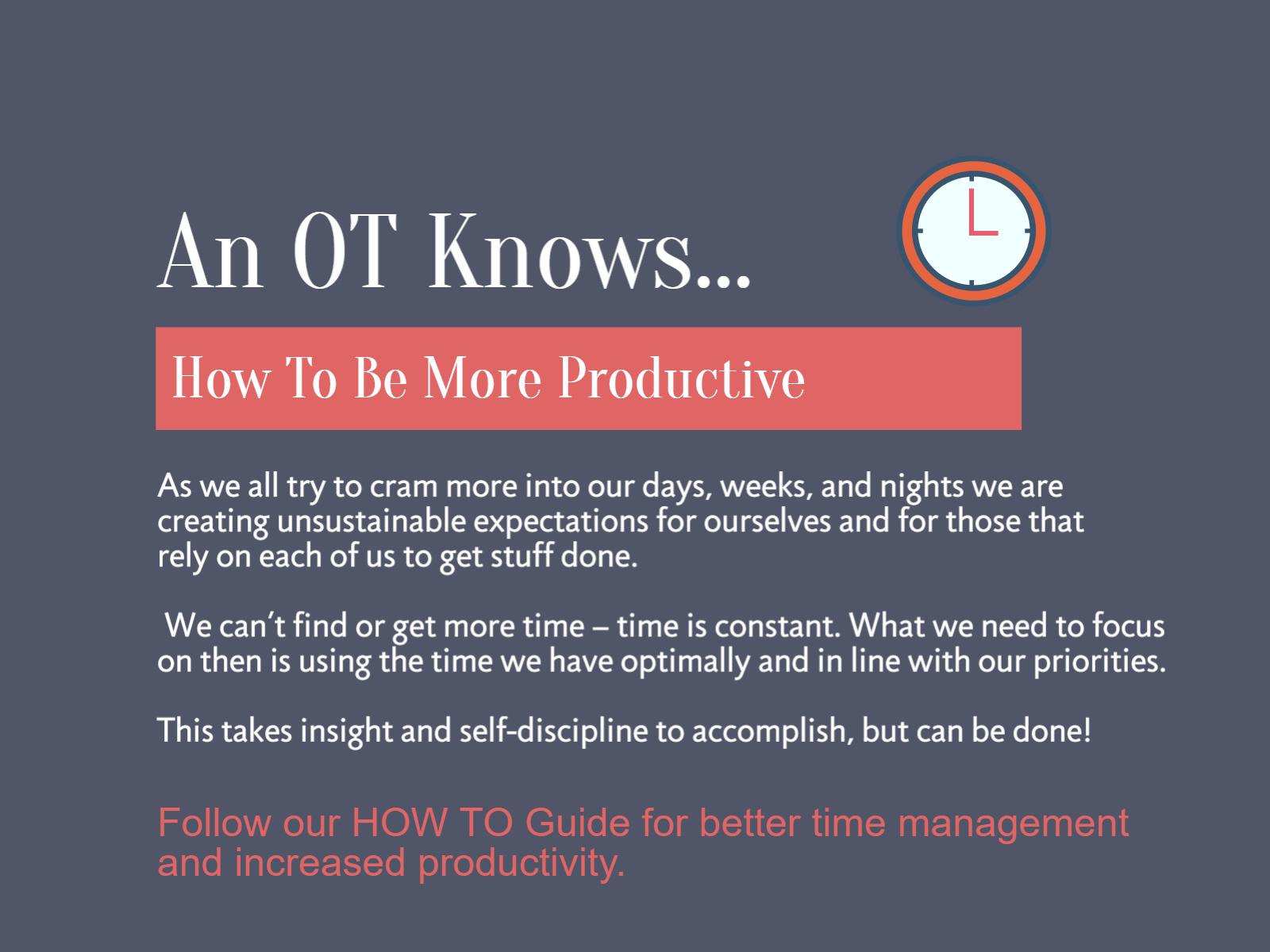
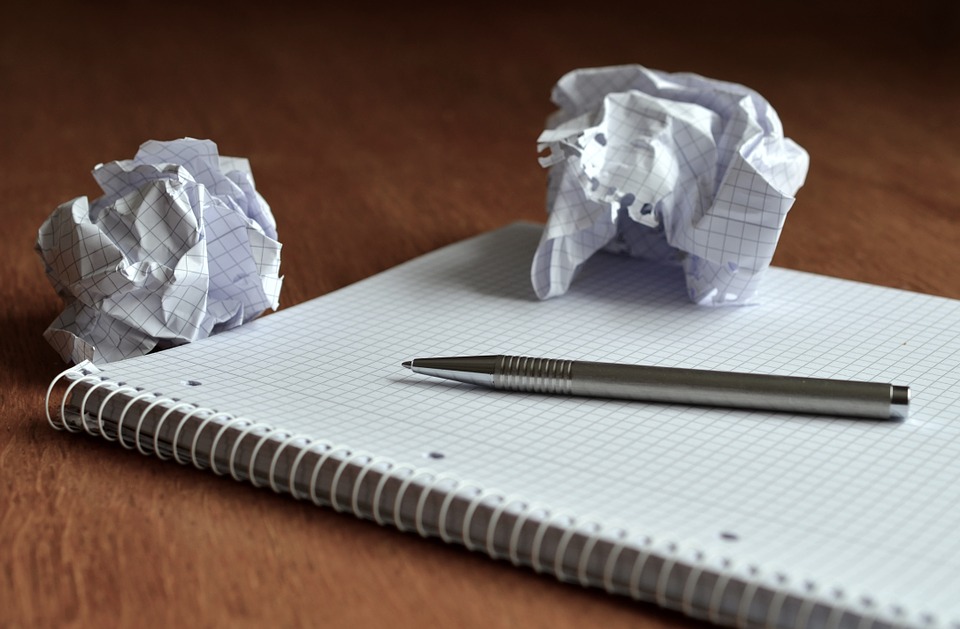
Procrastination is defined as “the action of delaying or postponing something.” Whether you’re the CEO of a large corporation or a stay at home Mom, we all procrastinate sometimes. But why? The following from Forbes Magazine will help you to delve deeper into the reasoning of why we put things off and provide you with tips to put a stop to your procrastination.
Forbes: The Truth Behind Why We Procrastinate
For more information on how to be more productive, check out our previous post: “Just Get Er Done.”

We all multi-task from time to time and while many feel this can improve productivity and their mental abilities, the following from Inc. Magazine states otherwise. Check out the following article and let us know if you agree or disagree.